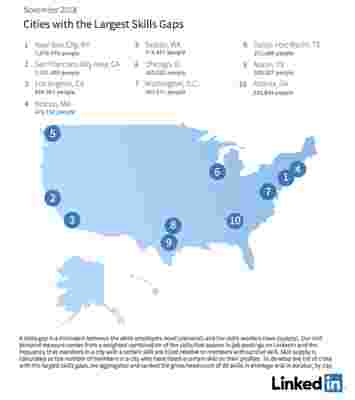LinkedIn report shows worker skills gap is largest on the two coasts
The latest LinkedIn Workforce report found that the skills gaps on both coasts are the largest in the United States.

While the same report mentions that hiring is up since last year, there’s something of a mismatch between the skills job hunters actually have and what employers are looking for.
This comes as good news for those workers with in-demand skills, but poses a challenge for those trying to stake a claim in a crowded landscape.
Many employers are finding it difficult to hire people with the skills they need, even at the entry level.
What’s more, it seems that our big metropolises — Los Angeles , San Francisco, and New York City — all have a similar surplus and shortage breakdown when it comes to workforce skills.
Here’s a little more about what this all means.
LinkedIn Workforce Report shows skills gap is largest on the two coasts
Big cities have a big soft skills shortage

As we mentioned above, the LinkedIn November report found that NYC, LA, and SF had similar surpluses. Skills like negotiation, procurement, real estate, and management accounting made the surplus list, as did wellness and personal coaching.
According to LinkedIn CEO, Jeff Weiner , employers are primarily on the hunt for soft skills these days. For example, written and oral communication, leadership, and project management are among the top skills employers want in their staff.
This means desirability isn’t always linked to a STEM background.
Coding, of course, is still in demand, but it’s worth pointing out that it isn’t the only skill that’s valued right now.
The reason for the new emphasis on the soft is, AI is on the verge of replacing a lot of the technical skills we associate with employability. Robots, at least at this point, haven’t nailed things like leadership, projecting warmth or recognizing body language.
The future, it seems, may well be characterized by humans — with their communication and empathy — working side by side with AI — and their quick processing power.

8 best sources for remote work opportunities
Measuring soft skills
Soft skills are important in just about every job, but many are role specific. If you look at the break down of Los Angeles skills shortages, you’ll notice that oral communication, business management, and leadership top the list.
According to a 2017 study by the HR software provider, iCIMS , 62% of recruiters seek out employees with excellent problem-solving skills , and 39% of recruiters look for highly organized candidates.
The challenge is, these skills don’t come with a certification attached.
While management and leadership may be implied by way of a resume with experience in a management role, things like oral communication or time management aren’t so cut and dry.
Recruiters these days screen candidates for evidence of soft skills, so including them in your application materials is a must. Make sure you highlight your softer strengths by highlighting searchable keywords in your job description and resume.
How to prepare for a FaceTime job interview
During the interview process, you should also be prepared to answer questions that begin with the dreaded, “can you give an example of a time when…”
These questions are called behavioral questions and are used to help interviewers evaluate one, how you respond to being put on the spot, and two, how your communication or time management skills have produced measurable results in the past.
Additionally, it’s worth noting that employers and recruiters may not be clear about what they’re looking for. For example, they might report in a LinkedIn survey that they want better communicators on staff, but fail to communicate that desire during the interview process.
As such, you should always emphasize your soft skills along with your hard ones — that combination of technical know-how and interpersonal savvy is what will ultimately land you the position you want.
Now you can search for jobs directly on Google
Closing up those gaps
According to another article from the social networking platform, skills gaps can be narrowed in several ways . Businesses may choose to move to cities with a surplus of the skills they need. Or, they may decide to look at working with remote employees by recruiting in those areas.
Job seekers may consider moving to a place that needs more of what they have to offer, and communities may start offering training programs that address the shortages.
The goal of the report was to highlight these areas, as cities with more skills shortages tend to have lower unemployment rates. And, transparency allows people to work on developing in-demand skills as they come up in the workforce.
How to use social media to find your next job
While some skills may come with experience and practice, it’s always worth looking for development opportunities. Additionally, working on things like conflict resolution, body language, and listening can help you advance, too.
Leveling up other in-demand skills like social media or digital literacy is something you can do in a relatively short amount of time. Workers can pursue online courses aimed at teaching the latest best practices, without breaking the bank. Coursera , Udemy , and countless others are all great places to boost those in-demand skills from the comfort of your own home.
More from Softonic
7 tips to enhance your LinkedIn profile ►
How the IoT will affect your job ►
How to create the perfect resume ►
6 Chrome extensions to make you more productive at work ►









